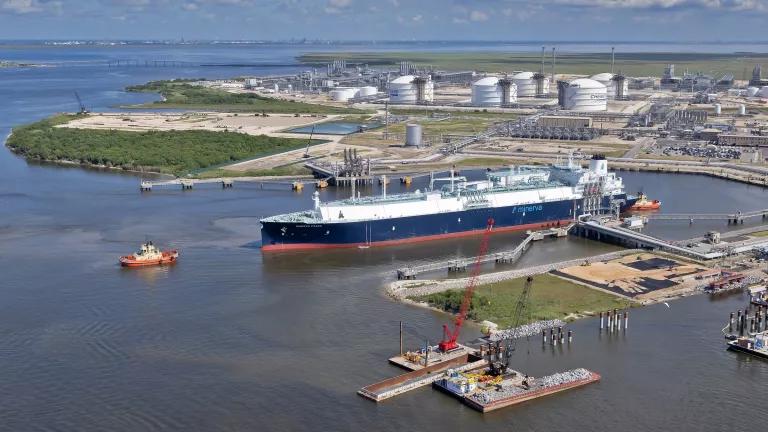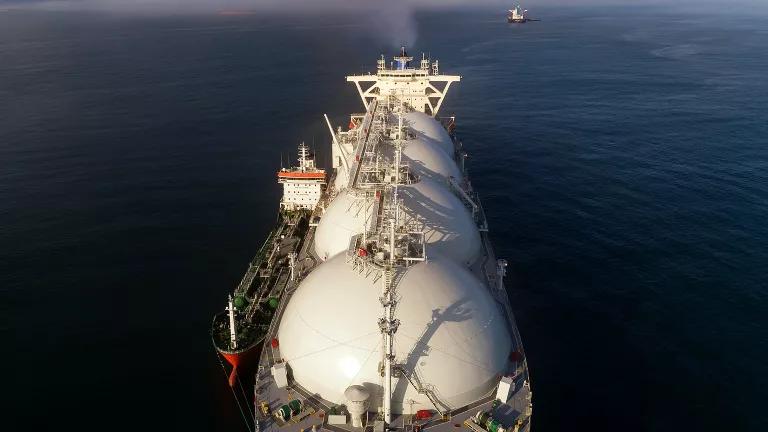Meet the Federal Energy Regulatory Commission
It’s one of the biggest climate players that you’ve (probably) never heard of.

Cheniere LNG Plant in the Sabine Pass in Cameron Parish, Louisiana
Most of the time, the Federal Energy Regulatory Commission (FERC) maintains a low profile, rarely making headlines. But as the world community wrestles with the moral, economic, and climate implications of consuming Russian energy products, natural gas (or fracked gas), and its ready-to-ship cousin, liquefied natural gas (LNG), are having something of a moment. That’s why now is a good time to explore the federal agency that wields such extraordinary power over America’s fossil gas industry, and that has the potential to make that industry safer and more accountable.
What is FERC, and what does it do?
FERC is an independent agency within the U.S. Department of Energy that regulates the interstate transmission of fracked gas and electricity. With regard to the latter, it oversees the interstate market for wholesale electricity sales and ensures the reliability of high-voltage interstate transmission systems, aka “the grid.” For gas, it largely regulates what happens to it after it’s been fracked from the ground but before it’s delivered directly to customers. As Gillian Giannetti, an attorney in NRDC’s Climate & Clean Energy program, puts it, FERC “oversees the interstate highway system” of gas as it crosses state lines and moves in and out of individual state jurisdictions.
FERC is also notable for what it doesn’t do. “Importantly, FERC doesn’t oversee decisions on fracking, gas power plants, or the construction of oil pipelines, all of which are reviewed at the state level,” Giannetti says. And while the agency has the power to determine whether a gas terminal does or doesn’t get built, “it doesn’t get to decide whether the U.S. actually exports any gas through a FERC-approved terminal,” she adds. “While FERC reviews applications for the infrastructure, the Department of Energy has the exclusive authority to decide whether—and to where—we export gas.”

The agency is composed of five commissioners who are nominated by the president and confirmed by the Senate for staggered five-year terms. The president selects a FERC chairperson from the five commissioners and can change the selection at any time; the current FERC chairman is Richard Glick. To help maintain FERC’s bipartisan identity, no more than three of the five commissioners can be members of the same political party. “Historically, FERC has been apolitical,” Giannetti says. “Most decisions are unanimous.” But even if the commissioners try to refrain from appearing biased in their decision-making, they’re still susceptible to pressure from political and business interests.
A thwarted attempt at self-improvement
Well before the invasion of Ukraine prompted countries to consider weaning themselves off Russian fossil fuels, U.S. energy policy was tilted toward making it easier to develop gas and LNG. Even though President Joe Biden has put climate action at the top of his agenda, America’s continued reliance on gas—not only as a domestic fuel source but as a source of export revenue—hamstrings efforts to fight the climate crisis. Natural gas, despite what the fossil fuel industry would have you believe, isn’t clean. Gas production is a notorious source of methane, which has 80 times the heat-trapping potential of carbon dioxide for the first 20 years of its release into the atmosphere. Pipelines transport most gas from its source, and a big part of FERC’s mission is to review and approve or reject applications for major gas pipelines and LNG export terminals.
The agency bases these decisions on whether the proposals are in accordance with the Natural Gas Act and the National Environmental Policy Act, which mandate that any new projects be consistent with the public interest. These reviews have historically been way too deferential to the gas industry, Giannetti notes, and have led to numerous legal actions taken against the agency on behalf of citizens and environmental groups. Too often, she says, “FERC has simply taken a gas company’s word that a project will help the climate, promote environmental justice, respect private property, and ensure national security, regardless of the volume or quality of evidence to the contrary. This is what has led FERC to lose over and over and over again in court.”
In mid-February, the agency attempted to respond affirmatively to court directives by proposing new guidance for the review of fracked gas projects. An agency press release described it as “a critical step in clarifying how it will address GHG emissions,” and Glick personally called the changes “long overdue.” The policy updates, FERC stated, would explicitly require the agency “to consider all impacts of a proposed project, including economic and environmental impacts, together.” They would furthermore call for “a robust consideration of impacts to landowners and environmental justice communities in the commission’s decision-making process.” Finally, the agency made it clear that the updated guidance would apply immediately to both new and pending projects.

Despite FERC’s reputation for bipartisan comity, the decision to modify the policies broke down along party lines, with the commission’s three Democrats voting in support of the changes and its two Republicans voting against it. That was an early sign that the proposed changes were likely to meet with tough resistance from fossil fuel interests and their partners in Congress.
Then, just one week after FERC’s announcement, Russia invaded Ukraine. That’s when opponents of the changes kicked into high gear with their rhetoric. As the international community, including the United States, reconsidered the morality of importing energy products from Russia, some began calling for a marked increase in U.S. gas production and LNG exports. Senator Joe Manchin of West Virginia, a stalwart champion of the fossil fuel industry, condemned FERC’s “reckless decision to add unnecessary roadblocks” to domestic gas production, a decision which he claimed “puts the security of our nation at risk.” Senate Minority Leader Mitch McConnell of Kentucky also weighed in: “At a time when we should be looking for ways to expedite the approval of these important projects,” he wrote, FERC “has chosen on a purely partisan basis to do the exact opposite.”
In short order, FERC announced a change of plans: The agency would now consider its updated guidance for reviewing fracked gas projects—issued with such fanfare only five weeks earlier—to be merely a draft, subject to further change after an extended public-comment period. The guidance would no longer be effective immediately. It would also, the agency said, no longer apply to pending projects: only newly proposed ones. Notably, there was no party-line division among the five commissioners for this vote. The decision to soft-pedal the new guidance was unanimous.

The fallout…and the future
For clean energy advocates like Giannetti, FERC’s backtracking on its climate and environmental justice commitments is a highly disappointing, though not entirely surprising, turn of events. “FERC’s policy statements represented a set of reasonable, measured, commonsense reforms that were directly related to its court losses,” she says. “But the gas industry has long had its way at FERC, and so any reforms—even ones that are directly connected to court directives—are going to face intense criticism.”
Clean energy advocates vow to keep the pressure up and to make sure FERC doesn’t abdicate its responsibilities under federal law to represent the public interest. “Clearly, relevant public interest factors include a project’s impacts on climate change, environmental justice, private property rights, and national security,” Giannetti says.
And if it doesn’t meet this responsibility by enacting these much-needed and overdue reforms? She puts it plainly: “It will continue to lose in court.”
This NRDC.org story is available for online republication by news media outlets or nonprofits under these conditions: The writer(s) must be credited with a byline; you must note prominently that the story was originally published by NRDC.org and link to the original; the story cannot be edited (beyond simple things such as grammar); you can’t resell the story in any form or grant republishing rights to other outlets; you can’t republish our material wholesale or automatically—you need to select stories individually; you can’t republish the photos or graphics on our site without specific permission; you should drop us a note to let us know when you’ve used one of our stories.
The U.S. is the world’s largest exporter of dangerous liquefied natural gas.
Tell the Biden administration you support its pause on LNG exports—and that you’re counting on it to phase out all dirty fuels and to fight the climate crisis.

Help protect communities from dangerous liquefied natural gas!
Liquefied natural gas (LNG) is a dangerous substance composed primarily of methane, a greenhouse gas 80 times more potent than carbon dioxide. The Biden administration has paused LNG exports—and now we must urge it to phase out all climate-wrecking fuels.


How to Ditch the Biggest Fossil Fuel Offenders in Your Life
What Are the Solutions to Climate Change?
The Real Reasons for High Oil and Gas Prices